Understanding the HOA Approval Process for Custom Homes

Navigating the HOA approval process can be a daunting task, but with the right knowledge and preparation, you can ensure a smooth experience while building your dream custom home.
The Role of HOAs in Custom Home Building
Homeowners' Associations (HOAs) play a significant role in maintaining the aesthetic and functional integrity of a community. When building a custom home, understanding the HOA's guidelines and regulations is crucial to ensure your project aligns with the community's standards.
HOAs typically enforce rules related to architectural design, exterior finishes, landscaping, and overall property maintenance. Their primary objective is to preserve property values and foster a cohesive neighborhood appearance. Before commencing any construction, it is imperative to engage with the HOA to understand their specific requirements and obtain the necessary approvals.
Essential Documents and Requirements
To gain approval from your HOA, you will need to gather and submit a variety of essential documents. These typically include detailed architectural plans, site plans, and material specifications. Each HOA may have its own set of required documents, so it is advisable to request a comprehensive checklist from the HOA board.
In addition to architectural plans, you may need to provide landscape plans, construction schedules, and proof of compliance with local building codes. Ensure that all documents are meticulously prepared and adhere to the HOA's submission guidelines to avoid delays in the approval process.
How to Prepare a Winning Proposal
Preparing a compelling proposal is key to securing HOA approval for your custom home project. Start by thoroughly reviewing the HOA guidelines to ensure your plans are in full compliance. Highlight how your design aligns with the community's aesthetic and functional standards.
Including detailed renderings and material samples can significantly enhance your proposal. Clearly outline the construction timeline, anticipated noise levels, and any measures you will take to minimize disruption to the community. A well-prepared proposal demonstrates your commitment to the community's values and increases your chances of approval.
Common Challenges and How to Overcome Them
One common challenge in the HOA approval process is meeting the stringent design guidelines. If your initial plans are rejected, consider working with an experienced architect who can help adjust your design to meet HOA standards while still achieving your vision.
Another challenge can be the timeline for approval. HOAs often have set meeting schedules, which may delay the review of your proposal. To mitigate this, submit your documents well in advance and maintain open communication with the HOA board. Being proactive and responsive can help expedite the process.
Tips for Maintaining a Positive Relationship with Your HOA
Maintaining a positive relationship with your HOA is essential for a smooth construction process and future interactions. Start by attending HOA meetings to understand the community's concerns and priorities. Engage with your neighbors and seek their input on your project, demonstrating your willingness to collaborate.
Transparency and communication are key. Keep the HOA informed of your progress and any potential changes to your plans. Address any concerns promptly and professionally. By fostering a respectful and cooperative relationship, you can ensure a positive experience throughout your custom home building journey.
When time comes to build your custom home get a free copy of our book for additional tips and processes: https://truestonehomes.com/how-to-build-custom-home-on-your-lot-book
.png?width=400&height=133&name=TRUE%20STONE%20LOGO%20(1).png)